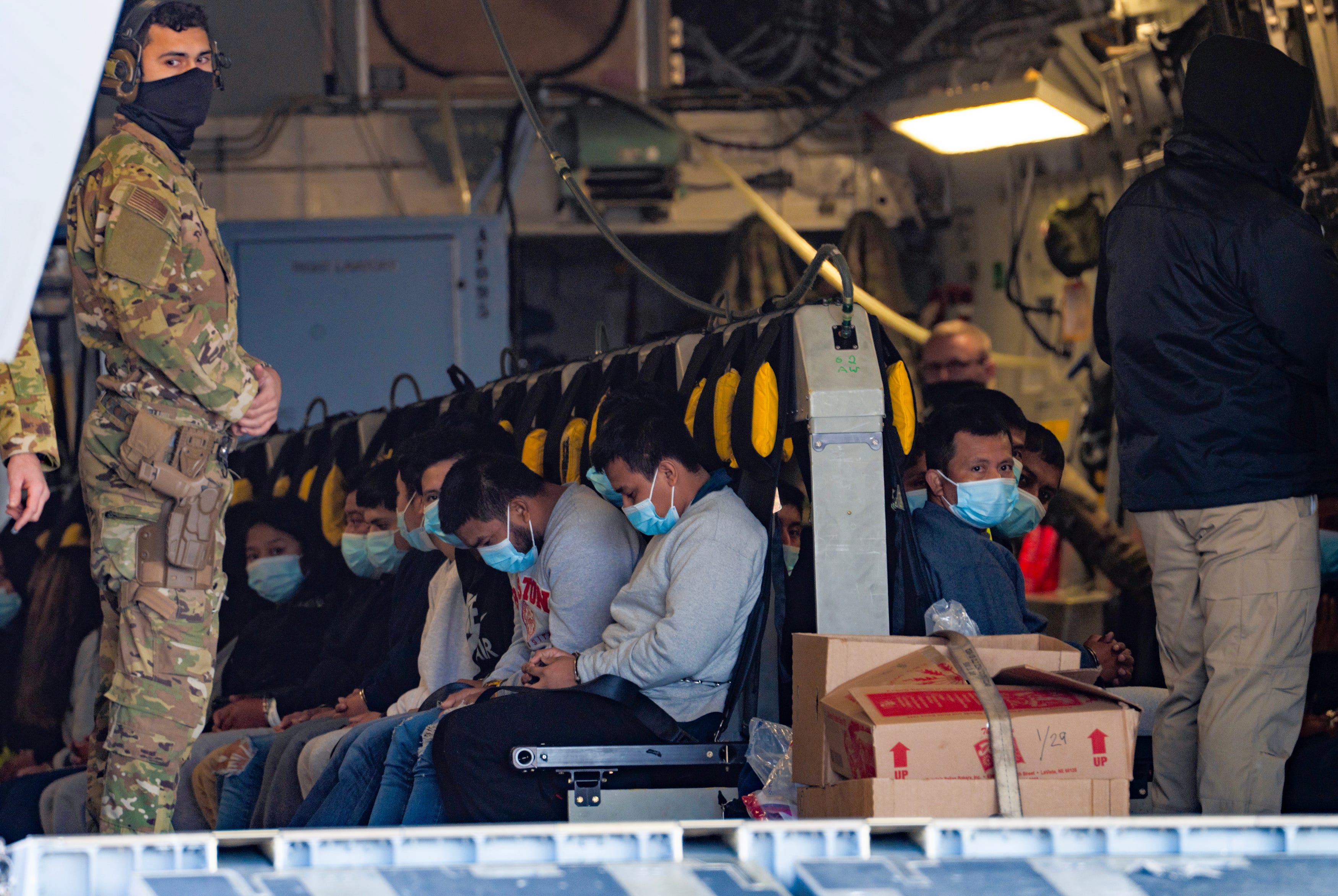Deportation Flights: A New Revenue Stream For A Budget Airline?

Table of Contents
The Financial Allure of Deportation Flights
The potential financial benefits of securing government contracts for deportation flights are significant, offering a compelling argument for budget airlines seeking to diversify their revenue streams.
High Occupancy Rates and Guaranteed Contracts
- Government contracts often guarantee a certain number of seats, significantly reducing the risk associated with fluctuating passenger demand typical of commercial flights. This provides a predictable income stream, unlike the volatile nature of the traditional passenger market.
- Deportation flights are typically full, maximizing revenue per flight. This high occupancy rate contrasts sharply with the often-empty seats seen on many commercial flights, leading to potentially higher profit margins.
- Consistent, predictable income stream. This reliable revenue generation can provide a crucial buffer against economic downturns affecting the commercial passenger sector.
The predictability of these contracts offers a level of financial security rarely seen in the typical passenger airline business. Data on the number and cost of deportation flights, while not publicly ubiquitous, could reveal significant profit potential for airlines willing to navigate the complexities involved. For example, if a government contracts consistently for 100 seats per week at a set price, the airline can reliably forecast revenue and plan accordingly, mitigating the inherent unpredictability of the commercial aviation sector.
Reduced Operational Costs
Compared to commercial passenger flights, deportation flights offer several opportunities for cost reduction:
- Less marketing and advertising needed. Government contracts eliminate the need for extensive marketing and advertising campaigns, a significant cost-saver.
- Simpler passenger services (fewer in-flight amenities). The provision of in-flight entertainment, meals, and other amenities is often minimal or absent, further decreasing operational expenses.
- Potentially lower insurance costs depending on contracts. Depending on the contract terms, the government might assume a portion of the insurance risk, leading to lower premiums for the airline.
Streamlining operations for deportation flights translates to reduced fuel costs, lower staffing requirements for ancillary services, and simplified logistics. The elimination of marketing and advertising alone can represent a substantial saving for budget airlines already focused on cost efficiency.
Filling Empty Seats and Optimizing Existing Infrastructure
Deportation flights provide a valuable opportunity to optimize resource utilization:
- Utilizing existing aircraft and crew resources during periods of low passenger demand. This is particularly beneficial for budget airlines experiencing seasonal fluctuations in passenger traffic.
- Potential for economies of scale by combining deportation flights with other routes. Strategic routing can minimize deadheading and optimize fuel consumption.
By filling otherwise empty seats on existing flights, airlines can significantly improve their load factors and overall profitability. This is particularly relevant for airlines operating routes with significant seasonal variations or in regions with high deportation activity. Such integration demonstrates a smarter, more efficient use of existing resources, boosting the bottom line without significant capital investment.
Ethical and Public Relations Considerations
While the financial allure of deportation flights is undeniable, significant ethical and public relations challenges must be addressed.
Public Perception and Brand Image
- Negative media attention. The association with deportation is inherently controversial and can lead to negative media coverage, potentially impacting public perception.
- Potential for boycotts and reputational damage. Public outrage could result in boycotts, significantly harming the airline's brand image and financial performance.
- The ethical implications of profiting from deportation. Many will question the morality of profiting from the forced removal of individuals from a country.
Airlines considering deportation flights must develop robust PR strategies to address ethical concerns and mitigate potential reputational damage. Transparency, clear communication, and a demonstrable commitment to humane treatment are paramount.
Human Rights Concerns and Transparency
- Need for adherence to international human rights standards. Airlines must strictly adhere to all relevant international and national laws and regulations related to the treatment of deportees.
- Ensuring humane treatment of deportees during transit. This includes providing adequate food, water, sanitation, and medical care.
- Concerns about transparency and accountability. Mechanisms for monitoring and oversight are essential to ensure compliance with human rights standards and prevent abuses.
Transparency is critical. Openly communicating the airline's commitment to human rights and detailing the measures taken to ensure humane treatment can help mitigate negative public perception. Independent monitoring and audits can further bolster the airline's credibility and demonstrate its commitment to ethical operations.
Logistical Challenges and Regulatory Hurdles
Securing and executing deportation flight contracts present numerous logistical and regulatory hurdles.
Government Regulations and Contracts
- Negotiating complex government contracts. These contracts often involve intricate legal and bureaucratic processes.
- Compliance with immigration laws and security protocols. Strict adherence to immigration laws and security regulations is crucial, demanding specialized expertise.
- Varying regulations across jurisdictions. Navigating the diverse legal landscapes of different countries adds significant complexity.
The legal complexities and the varying regulations across different jurisdictions demand specialized legal and logistical expertise. Airlines will need to invest in these areas to effectively manage these contracts.
Security and Safety Considerations
- Enhanced security measures for deportees. Transporting deportees requires heightened security protocols to prevent escapes and maintain order.
- Specialized training for flight crews. Flight crews require specialized training to handle the unique challenges of transporting deportees.
- Handling potential security incidents in transit. Airlines must be prepared for potential security incidents and have clear protocols for handling such situations.
The unique security considerations involved in transporting deportees require robust security measures and specialized training for personnel. Investment in training, technology, and security protocols is essential.
Insurance and Liability
- Higher insurance premiums due to increased risk. The inherent risks associated with transporting deportees will likely lead to higher insurance premiums.
- Defining liability in case of incidents or human rights violations. Clear definitions of liability are crucial in case of incidents or human rights violations during transit.
Securing adequate insurance coverage will be a key challenge, given the inherent risks associated with this type of operation. Airlines will need to work with insurers to define liability and secure appropriate coverage to mitigate potential financial consequences.
Conclusion
Deportation flights represent a potential, albeit controversial, revenue stream for budget airlines. While the financial incentives are undeniable, airlines must carefully weigh the ethical implications, public perception, and logistical challenges before venturing into this area. Thorough due diligence, a transparent approach, and absolute adherence to human rights standards are crucial. The decision of whether to pursue deportation flights requires a comprehensive cost-benefit analysis that considers all factors, including potential reputational damage. Ultimately, the question remains: is the potential profit worth the risk? Further research into the ethical and logistical aspects of deportation flights is essential for airlines considering this unconventional business model.

Featured Posts
-
 William Watson Scrutinizing The Liberal Platform Before You Vote
Apr 24, 2025
William Watson Scrutinizing The Liberal Platform Before You Vote
Apr 24, 2025 -
 Analyzing The Business Model Why A Startup Airline Is Utilizing Deportation Flights
Apr 24, 2025
Analyzing The Business Model Why A Startup Airline Is Utilizing Deportation Flights
Apr 24, 2025 -
 John Travolta Reassures Fans Following Controversial Bedroom Photo Post
Apr 24, 2025
John Travolta Reassures Fans Following Controversial Bedroom Photo Post
Apr 24, 2025 -
 Russian Gas Phaseout Eu Discusses Spot Market Strategies
Apr 24, 2025
Russian Gas Phaseout Eu Discusses Spot Market Strategies
Apr 24, 2025 -
 Missed Mammogram Leads To Breast Cancer Diagnosis Tina Knowles Story
Apr 24, 2025
Missed Mammogram Leads To Breast Cancer Diagnosis Tina Knowles Story
Apr 24, 2025
Latest Posts
-
 Interest Rate Decisions Understanding The Feds Divergent Path
May 10, 2025
Interest Rate Decisions Understanding The Feds Divergent Path
May 10, 2025 -
 Sudden Shift White House Withdraws Nomination Chooses Maha Influencer For Surgeon General
May 10, 2025
Sudden Shift White House Withdraws Nomination Chooses Maha Influencer For Surgeon General
May 10, 2025 -
 Real Id Act Impacts On Summer Travel Plans
May 10, 2025
Real Id Act Impacts On Summer Travel Plans
May 10, 2025 -
 Real Id Enforcement Your Summer Travel Guide
May 10, 2025
Real Id Enforcement Your Summer Travel Guide
May 10, 2025 -
 Why The Federal Reserve Lags Behind On Interest Rate Cuts
May 10, 2025
Why The Federal Reserve Lags Behind On Interest Rate Cuts
May 10, 2025
